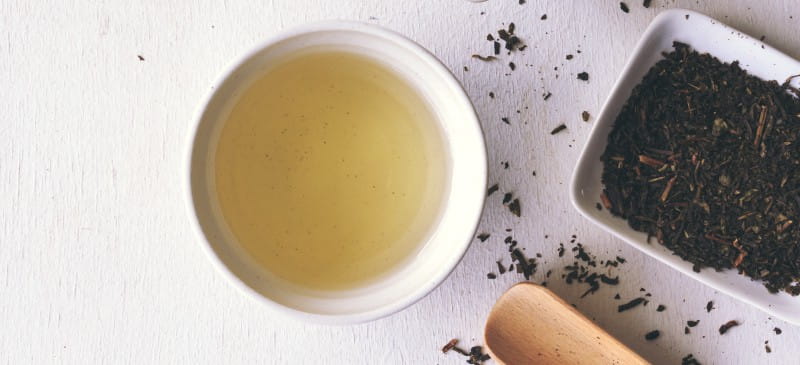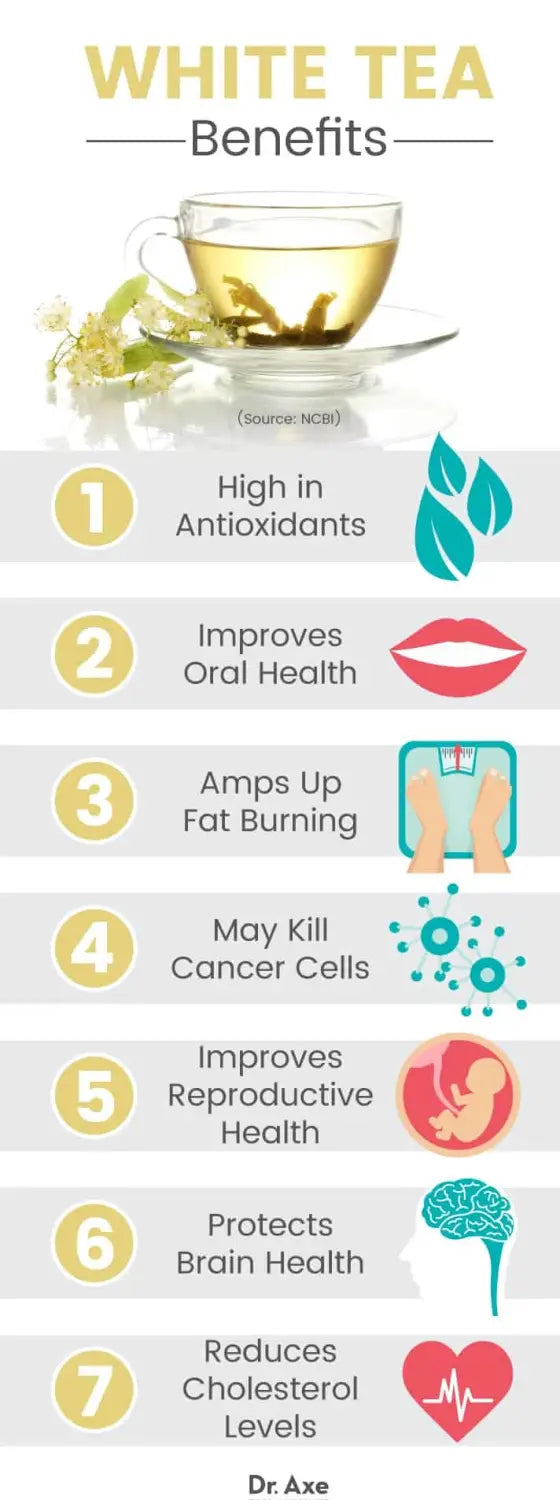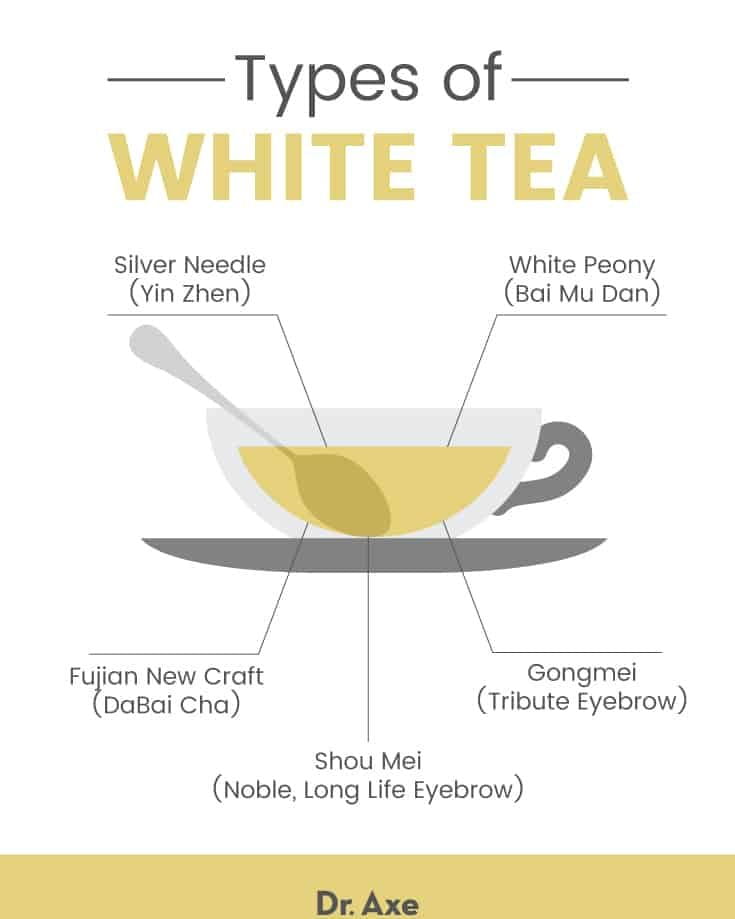The Health Benefits of White Tea
White Tea Benefits Brain, Oral & Reproductive Health

By now, you’ve probably heard all about the benefits of green tea. A cup or two per day is said to lower your blood pressure, alleviate inflammation, reduce the risk of heart disease and even give your memory a boost. Other types of tea like black tea, dandelion tea or hibiscus tea are also well-known for their health benefits. But what about white tea?
White tea is often overlooked in favor of more popular tea varieties. However, it packs in just as many — if not more — health benefits as other types of tea and offers a uniquely sweet and light flavor all its own.
It contains a comparable nutrient profile to green tea and is often even called “light green tea” because of its similar appearance. Much like green tea, it has also been associated with numerous health benefits, including improved brain, reproductive and oral health; decreased cholesterol; and increased fat burning.
What Is White Tea?
White tea is made from the leaves of the Camellia sinensis plant. This is the same plant that is used to make other kinds of tea, such as green or black tea.
It is harvested mainly in China but is also produced in other regions, such as Thailand, India, Taiwan and Nepal.
This type of tea is one of the most minimally processed teas. It is also harvested while the plant is still young, leading to a very distinct flavor. The white tea taste is often described as delicate and slightly sweet, and since it is not rolled or oxidized like other types of tea, it tends to have a much lighter flavor.
Much like other types of tea, white tea is abundant in polyphenols, catechins and antioxidants. For this reason, it has been associated with a host of health benefits, from increasing fat burning to fighting off cancer cells.
Related: What Is EGCG? Benefits, Dosage, Safety & Top Foods/Drinks
Health Benefits
1. High in Antioxidants
White tea is loaded with antioxidants, which help fight off harmful free radicals and counteract oxidative stress to cells. These beneficial compounds have even been shown to reduce the risk of chronic diseases like coronary heart disease, cancer and diabetes. (1)
Some research, like that published in the Journal of Food Science and conducted at the Department of Biological Sciences at Lehman College, has found that white tea and green tea contain comparable levels of antioxidants and polyphenols. (2) Green tea packs in tons of antioxidants and is even considered one of the top high-antioxidant foods.
Drinking a cup or two of white tea per day could make a major impact on your health. In fact, an animal study published in the British Journal of Nutrition found that daily consumption improved antioxidant status and prevented oxidative damage in rats. (3)
For best results, pair a cup or two per day with a diet rich in other antioxidant-rich foods like fruits and veggies.
2. Improves Oral Health
White tea contains many compounds that could help promote oral health, including plant compounds like polyphenols and tannins.
These compounds can help reduce plaque formation by blocking the growth of bacteria. Additionally, the fluoride found in the tea has a high bioavailability, which can prevent cavities. In fact, it’s estimated that about 34 percent of the fluoride in each cup is retained, according to research published in the Dental Research Journal — meaning it can help ward off cavities and give your oral health a boost. (4)
3. Amps Up Fat Burning
Research has found that white and green tea tea have similar levels of catechins. Catechins are plant compounds with antioxidant properties that help kick-start fat burning and give your metabolism a boost. (5)
A test-tube study out of Germany published in the journal Nutrition & Metabolism showed that white tea extract induced a breakdown of fat cells and also prevented new fat cells from forming. (6)
Other natural fat burners include ginger tea, grapefruit essential oil, cherries, coconut oil and bone broth.

4. May Kill Cancer Cells
Thanks to its high concentration of antioxidants, some studies have found that white tea could boast cancer-fighting properties.
A test-tube study published in Cancer Prevention Research treated lung cancer cells with white tea extract, which was found to kill off cancer cells. (7) Another test-tube study out of the University of Malaya in Malaysia showed that white tea extract was able to stop colon cancer cells from spreading and protect healthy cells against damage. (8)
In addition to tea, other antioxidant-rich foods include berries, ginger, turmeric and leafy greens.
5. Improves Reproductive Health
Multiple studies have found that white tea may help promote reproductive health and boost fertility, especially in men.
In an animal study out of Portugal, giving prediabetic rats white tea was found to prevent testicular oxidative damage caused by free radicals, helping preserve sperm quality. (9) A 2016 animal study published in the Journal of Nutritional Biochemistry had similar findings, noting that giving white tea extract to animals with prediabetes improved sperm quality by increasing its ability to move and restoring its viability. (10)
6. Protects Brain Health
Research shows that white tea may help protect your brain health due to its high catechin content.
A test-tube study from San Jorge University in Spain in 2011 showed that white tea extract effectively protected rat brain cells against oxidative stress and toxicity. (11) Another test-tube study out of Spain published in Neurotoxicity Research also found that white tea extract prevented oxidative damage in brain cells. (12)
White tea also contains a similar antioxidant profile to green tea, which has been shown to improve cognitive function in the elderly and reduce the risk of cognitive decline. (13, 14)
7. Reduces Cholesterol Levels
Cholesterol is a fat-like substance found in your blood. Although your body needs cholesterol, having too much can cause plaque to build up in the arteries, causing the arteries to narrow and harden.
White tea benefits your heart health by helping lower cholesterol levels. In one animal study, treating diabetic rats with white tea extract resulted in a reduction of total and bad LDL cholesterol levels. (15)
Other ways to lower cholesterol naturally include eating more high-fiber foods with healthy omega-3 fatty acids and limiting your intake of sugar, refined carbs, trans fat and alcohol.
Related: Jasmine Tea Benefits for Skin, Brain & Heart Health (Plus How to Make It)
Types of White Tea
There are several variations of white tea that vary based on what part of the leaves are used as well as the taste and quality of the final product. The main types are:
- Silver Needle (Yin Zhen)
- White Peony (Bai Mu Dan)
- Gongmei (Tribute Eyebrow)
- Fujian New Craft (DaBai Cha)
- Shou Mei (Noble, Long Life Eyebrow)
Of these, Silver Needle and White Peony tend to be the most common and are considered the highest quality. Silver Needle has a sweet flavor and fruity aroma while White Peony has an earthy, delicate taste.

Nutrition Facts
White tea is high in health-promoting antioxidants, tannins, polyphenols, flavonoids and catechins. It also contains a good amount of fluoride, which can help protect the teeth against cavities.
But does white tea have caffeine? Like most other teas, it does contain a small amount of caffeine. However, the white tea caffeine content is lower than other types of tea, such as black or green tea. It contains between 15–20 milligrams of caffeine per cup, while green tea can have up to 30 milligrams and black tea contains 50 milligrams.
White Tea vs. Green Tea vs. Black Tea
Black, white and green tea all come from the same plant but are different in the ways that they are processed as well as the nutrients that they provide.
White tea is harvested earlier than green or black tea and is the least processed form of tea. Green tea is less processed than other types of tea, such as black or oolong tea, and does not undergo the same withering and oxidation process.
Green tea is usually described as having a light, earthy taste while white tea is more sweet and delicate. Black tea, on the other hand, tends to have a stronger, slightly richer flavor.
White tea vs. green tea are the most comparable in terms of nutritional value. Both are rich in beneficial polyphenols, antioxidants and flavonoids, and studies show that they also contain a similar amount of catechins. Green tea contains a slightly higher amount of caffeine but is still low compared to the amount found in black tea.
Additionally, white tea benefits vs. green tea benefits are also similar. Both have been shown to fight off cancer cells, rev up fat burning and lower cholesterol levels. Black tea has also been associated with a wide array of health benefits, from boosting heart health to killing bacteria.
Although all three of these teas have minute differences in taste, nutrition and processing methods, they can all be included as part of a nutritious diet to help promote better health.
How to Use and Steep Tea
Wondering where to buy white tea? You can easily find many different brands at most grocery stores. There are also many types available, including organic white tea, and the white tea price is usually comparable to other types of tea.
When it comes to actually making the tea, using boiling hot water can decrease the flavor and even deplete the nutrients found in the tea. For best results, bring the water to a roaring boil, let it sit for a few minutes and then pour onto the tea leaves.
White tea leaves are not as compact and dense as some other types of tea leaves, so it’s best to use at least two teaspoons of leaves for each eight-ounce cup of water.
The longer that you brew the tea, the stronger flavor and more concentrated nutrients it will provide. While some steep the tea leaves for just three to five minutes, others recommend brewing for up to 15 minutes to maximize flavor and health benefits.
Recipes
Many people steep their tea with fresh herbs to an infuse a unique flavor. You can try brewing with ginger, peppermint, turmeric, dandelion root, rosemary or oregano to spice up your next cup of tea.
You can also use white tea as a base for other drinks as well. Here are some interesting recipes for you to try:
History
Because it requires minimal processing, white tea is believed to be the earliest form of tea used in China, dating back thousands of years. There are even written records referring to it from the Song Dynasty, around the year 1105 A.D.
Back then, tea was prepared and used very differently than it is today. Tea leaves would be found in compressed cakes and were also steeped in stoneware kettles. Additionally, white tea was only allowed to be consumed by royals and was supposedly served as a tribute to emperors to show respect and honor.
Because white tea is not processed in the same way as other teas, it’s higher in many nutrients and has been well-known for its healing properties and benefits for centuries. It’s believed that white tea benefits skin, brain and heart health and even boosts weight loss. Today, we are just beginning to uncover the scope of potential white tea benefits as more research is conducted measuring its effects.
Risks and Side Effects
Although this tea boasts some pretty impressive health benefits, it’s just one piece of the puzzle and is unlikely to make much of a difference in your health unless paired with a balanced diet and regular physical activity.
Additionally, it’s difficult to say how applicable the results of these studies are, as most current research is limited to animal and test-tube studies. More studies need to be done on humans to determine how white tea may impact health.
White tea side effects mainly come from the caffeine content and may include insomnia, dizziness or gastrointestinal issues. Pregnant women should also limit caffeine intake to no more than 200 milligrams per day to avoid negative effects. For most, however, tea can be safely consumed with minimal risk of adverse symptoms.
Final Thoughts
- White tea comes from the leaves of the Camellia sinensis plant and is less processed than other types of tea, such as green or black tea.
- What is white tea good for? Benefits of this tea include improvements in brain, reproductive and oral health; lower cholesterol levels; enhanced fat burning; and anti-cancer properties.
- There are different variations that are made of different parts of the plant and provide a unique flavor. The two most common are Silver Needle and White Peony.
- Add this tea to a well-rounded diet, healthy lifestyle and regular physical activity to maximize its effect on health.





Leave a comment